“You are so organized it makes me nauseous.”
The man speaking to me was a rancher who helped lead a once-a-year, one-week church camp with his pastor friend. I’d spent the last five summers working at a licensed camp in various positions of support and leadership, but I was also a woman. My new husband and I quickly learned that if I wanted to make any suggestions at this little camp in Wyoming, they had better come from him because he was a man.
I wasn’t unfamiliar with misogyny and patriarchy, after all I spent a decade living in the cultic cloisters of Bill Gothard’s IBLP homeschool group. In my early marriage, I still strongly believed in wives submitting to their husbands as the leader of the home even though my husband was less convinced. But I’d always been strong, I’d always had opinions and ideas, and I’d always struggled to keep those parts of me reigned in.

Back in my cult days, I spent three years pretending to be someone else. I studied the pastor’s daughter who was my age, and worked hard to copy her sweet, quiet voice and gentle way of moving. I learned to step back, be helpless, and let the men lead. I tried not to talk or laugh too loud. I stuffed my real self down deep and she only escaped when I was super upset—which never went well and always got me in trouble.
As I ventured into the normal world in college and gradually rejected the patriarchy of my teenage years, I continued to hold onto beliefs about gender roles and expectations because they seemed “biblical.” I continued to suppress my strength as much as I could and tried to let the men around me be leaders. My marriage was another story. We became egalitarian before we even knew the word because my husband was determined to hear my opinions and be a united team. I found I could be my true self with him, as long as the ghosts from my past didn’t get in the way.
The real Deborah was the first crack in my firmly held beliefs about women and their roles. As I was reading through Judges about seven years ago, I came across her story, but a piece of it was missing. I’d heard in multiple places and from multiple people that Deborah was only a judge because there were no good men willing to lead. But that wasn’t in Scripture.
“Not only is Deborah not condemned for being a judge, she is called a prophetess. Last I checked there were only two kinds of prophets in Scripture—false prophets and true ones. She is obviously not a false prophet so that must make her a true one. Becoming a prophet is not something you get to choose. God picks you, gifts you, and fills you with His words. Things were starting to feel sketchy to me.”
Who Was the Real Deborah?
My journey to discover God’s actual view of men and women and their roles continued. About eighteen months later I was blogging again with new understanding. This was right as John McArthur said some insulting things about Beth Moore, so the timing was pretty impeccable.
“The best quote from my Bible Study Methods class last night:
“People who think they can understand the text using just the English translation are—let me think of an inoffensive word—simple.”
Then the professor proceeded to tear apart 1 Corinthians 14:34-35 where it says women should be silent in the church. He TORE IT UP! And laid it out again just by looking at the structure of the clauses. And in the process he validated all Christian women and boldly handed me my voice.
This incredibly smart professor is my new hero.”
The Power of Not-So-Silent Women
I read Beth Allison Barr’s book, The Making of Biblical Womanhood when it came out in 2020 and finished it with the cry of, “Go, be free,” ringing in my ears. Nijay Gupta’s Tell Her Story along with Kristi McLelland’s Bible study Jesus and Women only solidified my belief that in Christ there is neither male nor female. Women could freely use any and all gifts God gave them.
These days I am living fully into my giftedness and strength. I lead, I share truth, and I use discernment and wisdom. Interestingly, by embracing my strength, I have actually become gentler. It’s probably because I’m no longer bottling it up or acting defensively which is a good and beautiful thing.
Many of you reading this are probably feeling like you already know and agree with what I am saying. Maybe some of you are in a place of rethinking your own beliefs so you needed the confirmation. But perhaps others of you have recently heard new teachings on strict gender roles (that are resurfacing right now thanks to the Theo Bros) and are feeling drawn to them.
Why am I writing all of this? What is my point? I’m writing because I went down the Joe Rigney rabbit trail and need to get some things off of my mind and onto the screen.
Joe Rigney, a former pastor, the former president of Bethlehem College and Seminary in the Twin Cities, and current Fellow of Theology at New Saint Andrews College and associate pastor at Doug Wilson’s Christ Church in Moscow, Idaho, recently wrote the controversial book, The Sin of Empathy.
I’ve heard many opinions recently about the book and theme, mostly from people on Threads and Substack affirming that empathy it NOT actually a sin. There’s a lot I could say about this, and I might another time, but this isn’t the post for that. I haven’t read Rigney’s book, but I came across a review by
at Still More to Say that made me shake my head and roll my eyes while muttering, “Of course.”“When an author uses something like The Sin of Empathy: Compassion and Its Counterfeits for the title of his book, you can count on it being provocative. And indeed Joe Rigney’s new book is, the title alone being enough reason for it to garner plenty of attention both within and outside the target audience of MAGA-style Christians.
But The Sin of Empathy is more than provocative: It’s a misogynistic mess in which the author pulls a sort of bait and switch, never really arguing that empathy as typically defined is inherently sinful, but instead using the book as a springboard to suggest that American Christianity has become too feminized.”
Of course they used a made-up definition of empathy. Of course they claimed this invented definition was feminine and therefore dangerous. After learning that The Sin of Empathy was published by Doug Wilson’s Canon Press, I wasn’t surprised. It was all so familiar. Down the Joe Rigney rabbit hole I went, and I quickly found a post on X that made me almost lose my mind.
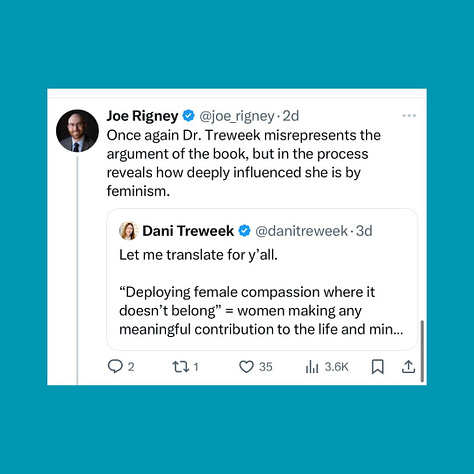
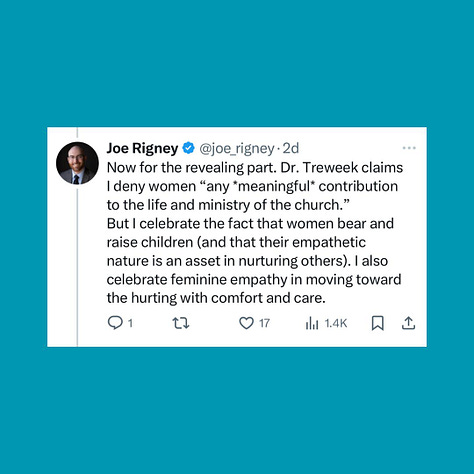
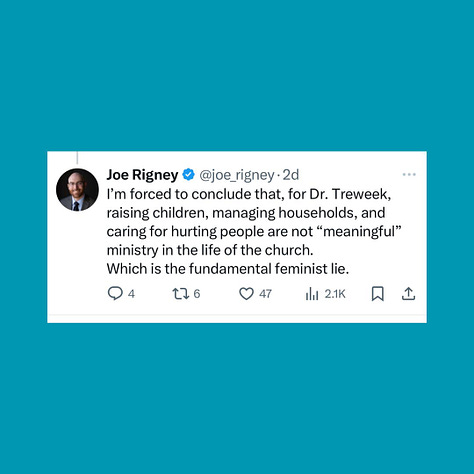
In this series of posts Joe Rigney tries to combat the idea that he doesn’t think women can make any meaningful contribution to life and ministry of the church. He replies that he believes women can bear and raise children and help comfort and care for hurting people. These are meaningful contributions, Rigney asserts!
I agree that motherhood is meaningful as long as long as it’s not the only contribution I’m allowed to make as a woman. It’s only meaningful if I’m not limited to these narrow contributions to society, otherwise Rigney’s beliefs are oppressive. But in Joe Rigney’s world of Doug Wilson, Christ Church, and Christian Nationalism, many men believe that women shouldn’t even be able to vote. So I’m pretty sure that he means it when he says my only place is in the home bearing and caring for children.
I’ve lived this world once before, and you’d better believe I’m not going back there again especially now that I know it comes from misplaced Victorian ideology and not biblical truth.
’s book The Evangelical Imagination made my entire world make sense when I read it last summer.Growing up in Gothard’s cult, we had a strange fascination with the 1800s. I often felt that I had been born in the wrong century and would have been better suited to life on the prairie or on Prince Edward Island. Much like modern trad wives on Instagram, women celebrated all things domestic and leaned into our female roles. We tried to go back to a simpler time of “old fashioned values,” and we idolized great Christian preachers and missionaries from the Victorian era.
The problem is that the world we idolized never existed. Our Christian reconstructionist version of history conveniently ignored awkward truth and emphasized only the parts that we wanted to replicate. The same thing is happening again today in certain Christian circles. They are imagining a past that didn’t exist, calling it biblical, and trying to recreate it. I’m guessing that most of the people buying into this ideology didn’t experience the dark side in their teens and twenties like I and women such as
did.In case you need any more red flags about Joe Rigney, he first wrote an article about his sin of empathy in 2019 for Desiring God. Copying C.S. Lewis in The Screwtape Letters, Rigney claims that empathy is vastly different from compassion and demands that you jump into the pit of quicksand with a victim. Here we already see a twisted understanding of empathy. In 2021, Rigney recorded a controversial podcast episode with Doug Wilson also about his favorite topic. When he resigned from Bethlehem College and Seminary in 2023, Rigney accepted a position from Wilson’s New Saint Andrews College just one week later.
Back in my cult days, before the internet and social media, our crazy ideas mainly stayed with us and anyone else we could personally convince to join our group. But thanks to modern technology, dangerous ideology is free to spread far and wide. It is well documented that women are not safe within Doug Wilson’s network of churches and schools.
The Sons of Patriarchy podcast has done a wonderful joy of listening, documenting, and sharing truth about what is going on in Moscow, Idaho and beyond. This is the intro on their website:
“What happens when biblical patriarchy, Christian nationalism, and a theology of authority and submission become the pillars of a movement? Scores of abuse stories in marriages, schools, churches, families, and more.
Though these ideas have filtered throughout the United States for decades, they found a home in Moscow, Idaho, through the ministry and work of Doug Wilson. From there, they have influenced churches across the United States, and across the world.
In this series, you'll hear from experts on all aspects of these movements, and the stories of abuse from those who survived. Some are Christian, some are not, but one thing they've got in common? They're finally speaking out.”
In my personal experience, every time a man was intimidated by me and my strength, they had something to hide. Most of them did not value or respect women. They were afraid of my ability to discern truth and wanted to keep me quiet. I find that telling.
I’m currently reading an advanced copy of
’s new book Becoming the Pastor’s Wife. Listening to her share stories from history—ancient, medieval, and more recent—and hearing about women buried in the archives of the SBC, I’m once again convinced that this push to suppress women isn’t even close to being biblical. It’s traditional, ideological, and sinful.So I’ll keep speaking up, sharing truth, and using my voice. I’ll lean into the gifts God has given me even if I am a woman. I’m grateful for all the men who follow me here and on Threads. Every time another man shows that he is willing to listen to my voice, value my ideas, and support me as a woman, another part of my heart heals. I appreciate you.
As always, I'd love to hear your thoughts, questions, or comments. You can find me on Threads, Instagram, Facebook, in the Substack app, and on my website. I’d love to connect with you on any of these places!
My podcasts, Religious Rebels and Looking for the Real God can be found here on Substack, and on YouTube, Apple Podcasts, Spotify, iHeart Radio, and anywhere you listen to podcasts.
You can order an autographed copy of my book, Religious Rebels: Finding Jesus in the Awkward Middle Way by clicking on the button below. Or you can find it on Amazon.





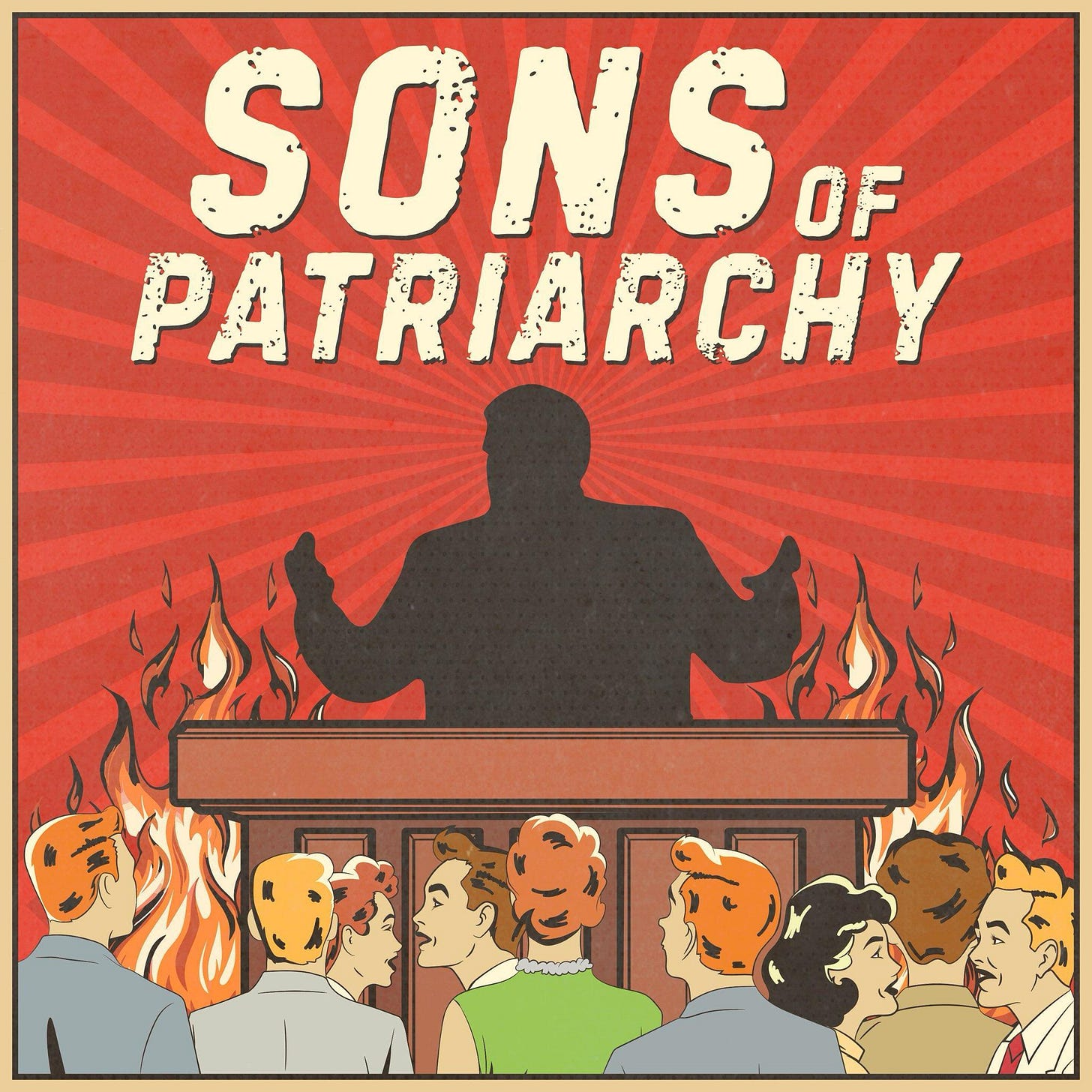

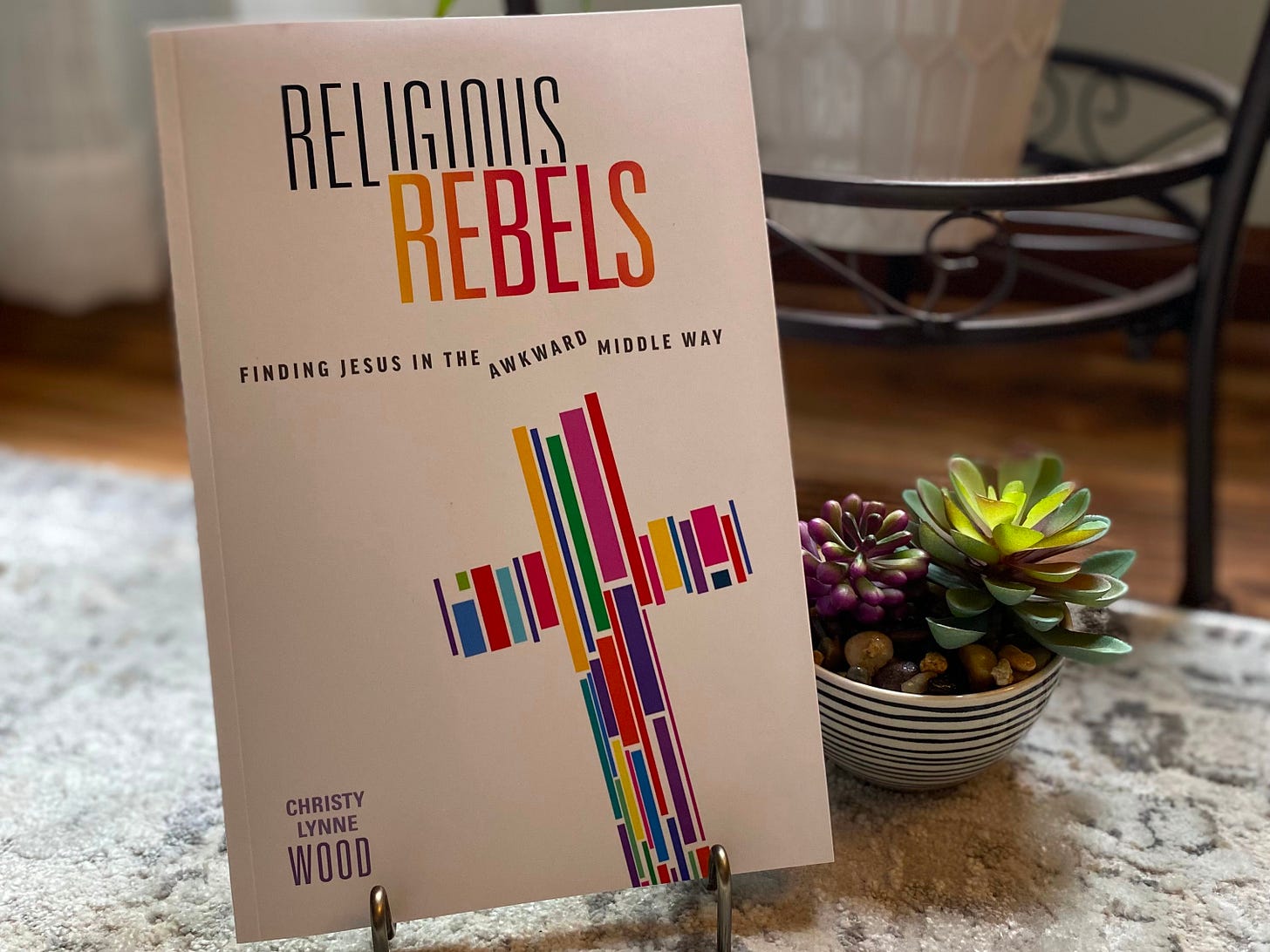
Thank you for such a thoughtful piece, Christy. I’m frustrated with how women are treated the Church. The omnipresent condescension and stereotyping, longing for an image of a “better time” that never existed.
My wife is strong willed: a force of nature. If I’m called to love her “as Christ loved the Church,” then I’m to sacrifice all I have, make less of myself, and die to my own desires.
I see no valid interpretation of scripture where suppressing her vitality and spirit is Christ-like. We’re a unified team the serves one another, not a master and servant. Egalitarian or complementation—loving sacrifice is required; it’s the point of marriage.
If you haven’t come across it, I heartily recommend Gary Macy’s The Hidden History of Women’s Ordination: Female Clergy in the Medieval West. It gets at this discussion in historic terms with the power of a helpful but succinct argument. Namely- we have the evidence of women’s ordination into various church roles in Christian history but this is obscured in large part because the nature or ordination itself underwent a major revision in the 1100s.
The practical upshot? The maximalist capital G capital T Great Tradition of unbroken male only ordination is historically untenable.
God bless!